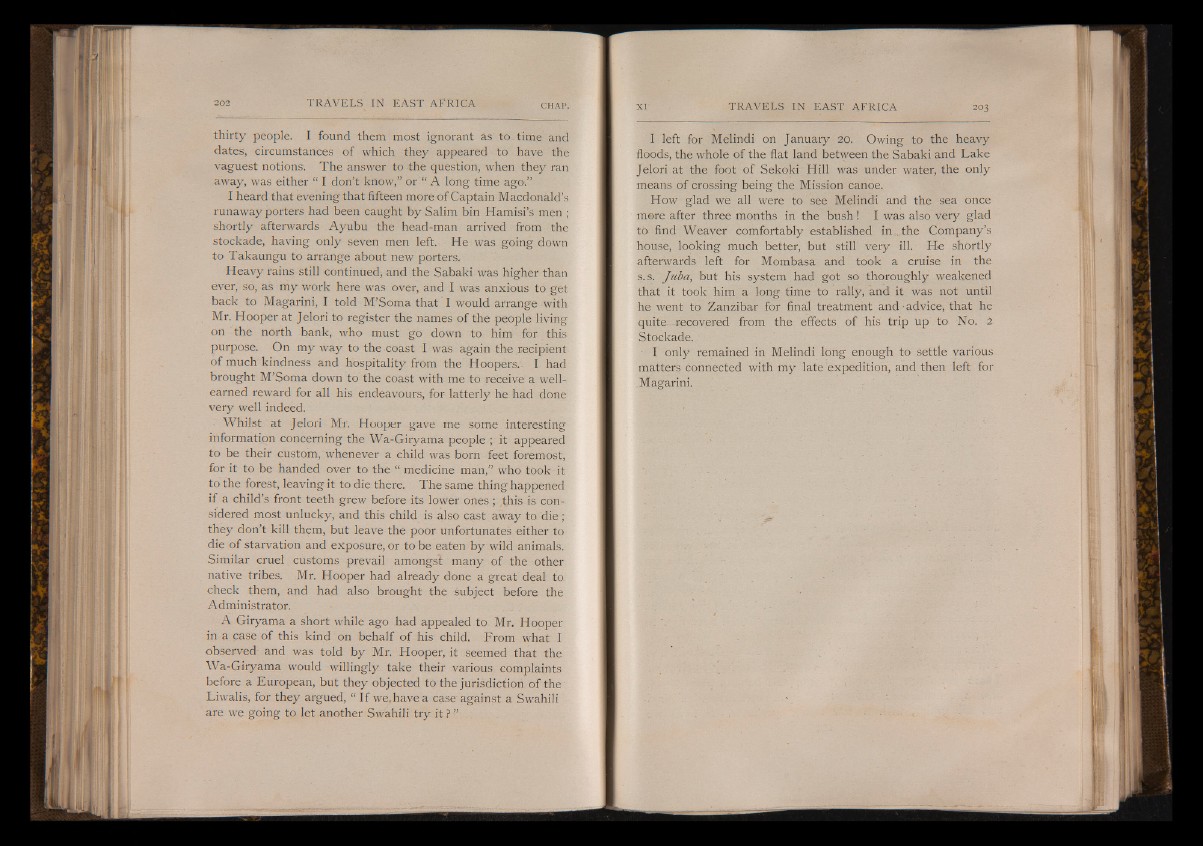
thirty people. I found them most ignorant as to time and
dates, circumstances of which they appeared to have the
vaguest notions. The answer to the question, when they ran
away, was either “ I don’t know,” or “ A long time ago.”
I heard that evening that fifteen more of Captain Macdonald’s
runaway porters had been caught by Salim bin Hamisi’s men ;
shortly afterwards Ayubu the head-man arrived from the
stockade, having only seven men left. He was going down
to Takaungu to arrange about new porters.
Heavy rains still continued, and the Sabaki was higher than
ever, so, as my work here was over, and I was anxious to get
back to Magarini, I told M’Soma that I would arrange with
Mr. Hooper at Jelori to register the names of the people living
on the north bank, who must go down to him for this
purpose. On my way to the coast I was again the recipient
of much kindness and hospitality from the Hoopers: I had
brought M’Soma down to the coast with me to receive a well-
earned reward for all his endeavours, for latterly he had done
very well indeed.
Whilst at Jelori Mr. Hooper gave me some interesting
information concerning the Wa-Giryama people ; it appeared
to be their custom, whenever a child was born feet foremost,
for it to be handed over to the “ medicine man,” who took it
to the forest, leaving it to die there. The same thing happened
if a child’s front teeth grew before its lower ones ; this is considered
most unlucky, and this child is also cast away to die ;
they don’t kill them, but leave the poor unfortunates either to
die of starvation and exposure, or to be eaten by wild animals.
Similar cruel customs prevail amongst many of the other
native tribes. Mr. Hooper had already done a great deal to
check them, and had also brought the subject before the
Administrator.
A Giryama a short while ago had appealed to Mr. Hooper
in a case of this kind on behalf of his child. From what I
observed and was told by Mr. Hooper, it seemed that the
Wa-Giryama would willingly take their various complaints
before a European, but they objected to the jurisdiction of the
Liwalis, for they argued, “ I f we.have a case against a Swahili
are we going to let another Swahili try it ? ”
I left for Melindi on January 20. Owing to the heavy
floods, the whole of the flat land between the Sabaki and Lake
Jelori at the foot of Sekoki Hill was under water, the only
means of crossing being the Mission canoe.
How glad we all were to see Melindi and the sea once
mere after three months in the bush! I was also very glad
to find Weaver comfortably established in The Company’s
house, looking much better, but still very ill. He shortly
afterwards left for Mombasa and took a cruise in the
s. s. Juba, but his system had got so thoroughly weakened
that it took him a long time to rally, and it was not until
he went to Zanzibar for final treatment and • advice, that he
quite recovered from the effects of his trip up to No. 2
Stockade.
I only remained in Melindi long enough to settle various
matters connected with my late expedition, and then left for
Magarini.